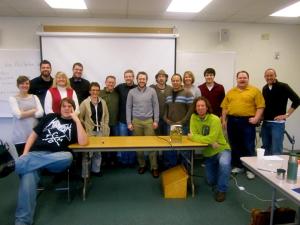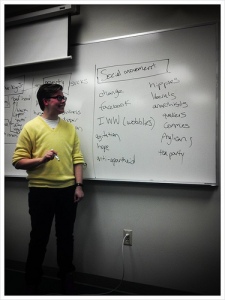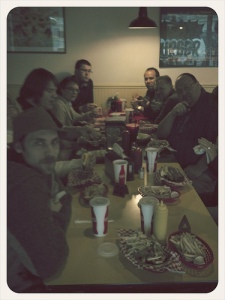Teaching My First Seminary Class

This week I had the opportunity to meet face-to-face with my first ever class. I’ve been teaching a course online for George Fox Seminary called “Culture and Systems Change” since the beginning of January, but since it is what they call a “hybrid” course, that means that we also have some time together in the middle of the semester. Almost all of the students in my class this semester are scattered throughout the country (from Hawaii to Virginia). The online portion of the class has been going really well and so I was pretty excited for this week to come where I would have a chance to sit in a classroom with these 15 students – almost all of whom are pastors or working “in the ministry” in one way or another – and have an opportunity to go deeper into our subject matter.
The course is based loosely on a class I was a TA for at Fuller almost ten times with my doctoral adviser, Ryan Bolger. In the class we are looking at what culture is and how we can understand change within culture and organizations based on this. We covered models of “contextual theology” (or theologies that arise out of particular cultural settings), and what systems theory has to says about these things as well. During the face-to-face time this week I had an opportunity to do some fairly dialogue-oriented lectures, as well as invite some of my friends to come and talk about the work they are doing in these areas.
Our first guest was Jeremy Seifert, a good friend of mine from our days of living in Pasadena, who visited us via a Skype video call. He has been making documentaries focused our social issues like hunger, waste and other food related topics (you can see a trailer to his latest project here GMO the Film). We watched his short film “Dive!” and then spoke to him about how he understands documentary-filmmaking in terms of bringing about change, how he chooses his subject, and how he approaches differences within the cultures he looks at (like his recent visits to Haiti).

Then two of my good friends from the Vancouver/Portland area Jade Souza and Aaron Scott visited our classroom and led us in some very useful, and moving, discussions around poverty, power analysis, and Martin Luther King’s Poor People’s Campaign. Both Jade and Aaron have been like mentors to me on these issues over the last couple years and I have had a privilege to work and march with them in a number of situations, most recently with a group called Parents Organizing for Welfare and Economic Rights and now Families For Justice.
Finally, the students did presentations on people throughout recent history who have lived out their theology in ways that have brought about change in the world. These “Biographies as Theology” were a major highlight for me in the class. The students offered very passionate re-tellings of some people I’ve learned about and some I’ve never heard of before, all people who sought to be faithful to the call of Christ to bring about change in the world. The people we discusses in our class were folks like: Wangaari Mathai, Jimmy Allen, D. Bonhoeffer, Nathan Winograd, Simone Weil, Dorothee Sölle, Mazhar Mallhoui, George Fox, Father Damien, Cesar Chavez, George Muller, Margaret Fell, Oscar Romero, William Wilberforce. People who were liberation theologians, mystics, catholic priests who were gunned down while serving communion, farm-worker organizers, Quakers, African feminists, Baptist ministers who broke the mold of which they were apart, Christians who took seriously and treated kindly Muslim brothers and sisters, priests who lived among lepers, all who in one way or another embodied their theology in powerfully moving ways.

This is how we ended class. Telling stories of people who didn’t necessarily fit any one “model” or any particular category, but who found God in the most unlikely places and responded to the call to stand in solidarity with those who cried out to God.
No, actually, this is how we ended class, at George’s Giant Burgers.
Now it’s back to our online conversations, with a lot of good interactions and some faces to go along with discussions online.
I loved teaching. Not only was it fun, but it was challenging, and really stretched me in many ways. At the end of the class, I felt like we needed to have another week to meet together because there’s still so much more to discuss. I took this as a good thing. If I get another chance, I think I’ll be taking it.